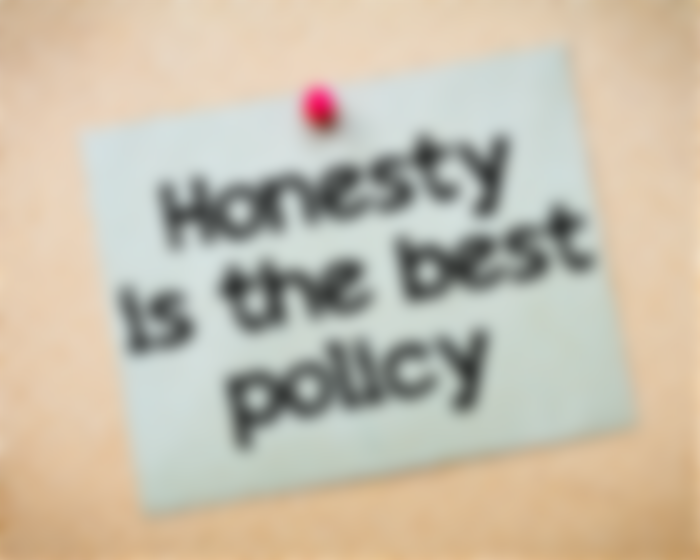How honest are you: What role does honesty play in human relations?
“Honesty is first celebrated, then left in the cold to freeze.”
Decimus Junius Juvenalis
Everything on earth tends towards honesty. When we speak our truth, we are freed from guilt, shame, reluctance, grief, and despair. Honesty, nourished by the channels of truth, sincerity, modesty and vulnerability are the only qualities that will ultimately liberate us all, because as long as we deny the truth in our hearts, we will live like prisoners living under false identities. In the end, everything finds its way again and again and surrenders to honesty.
When it comes to honesty, most of us think of only the act of telling the truth. However, its nature is much deeper than this act, because what is called truth is subjective, what is true for one person may not be considered as absolute truth for another. Thus, simply telling the truth is often a harmful act, as one's understanding of truth is greatly influenced by one's own experiences, perspectives, and prejudices.
Integrity is the willingness to see things as they are, without any reason or intention to change them. From the moment we were born, we divided the world into "us" and "everything else", and we pursued only those things that would benefit us through the cycles created by our habits. So we created our first identities. We left “everything else” to ourselves, and in this way, we also produced our selfishness by constantly sacrificing honesty.
When we look at the state of our civilization, which we have created with the glorification of "I"s rather than "moments", we cannot say that we are able to live because we are not completely honest. However, being honest also means being able to fully relate to every moment. When we are dishonest, we miss this moment because we think about the next moment, the last moment, or the moments of next week. By directing our attention to the past or the future, we disrespect both our current self and everything and everyone around us, and we avoid accepting what is as it is.

Telling the truth emerges with the awareness of the simple. We also need to examine our motivations as we speak to make sure there is no trace of our clinging behind our words. For example, people who are active for social or political reasons sometimes become addicted to feeling superior. Their prowess is often tainted by their need to feel morally superior to others.
There is a delicate relationship between honesty and truth. Integrity also raises the question of whether choosing to be honest entails telling everything, or is it a more morally responsible choice to withhold certain information? Some of us may have a hard time deciding whether to keep certain information private to avoid hurt, embarrassment, or other negative consequences. Think of a judge listening to a witness during a trial. When the judge in our mind asks the witness to describe what happened that day, the request is only for what is relevant, not for any particulars. So who's to say which details are relevant?
Of course, your two selves will answer this question.

Integrity and self
Being honest involves the capacity to choose specific details about our lives in a matter-of-fact manner, but also to understand how our actions do or do not conform to the rules and expectations of both ourselves and the other person who is our interlocutor. First we need to realize if we are being honest with ourselves. This is an important issue discussed not only by the likes of Plato and Kierkegaard, but also in David Hume's book Philosophical Integrity. Being honest with ourselves is also part of being authentic. Only those who can face themselves with all their characteristics can also have the ability to develop an authentic personality for the self. At least those who claim to authenticity are putting forward these ideas.
The tendency to tell the whole truth and to realize it in oneself turns into a habit developed over time as it is practiced. In other words, an honest person is one who, while conversing with another, has developed the habit of conveying to the other all details of his life that seem relevant to the subject of the conversation. The ability to discern what is relevant is of course also part of honesty in this case. At this point, the subtleties of speech can be mentioned. Hatred, greed, and ignorance of what's happening in the "moment" undermine our bond with ourselves and with others. In conversations designed to get something we want, hurt someone we don't like, or look like someone important, we are never dishonest, even when speaking the truth.
“All self-interested speech is false or harmful speech.”
Reb Anderson
Our talk of personal concern is also designed to promote ourselves, protect ourselves, or get what we want because it contains "partial truths".
If we constantly feel a lack, if we sabotage ourselves, if we are told, but if we do not take any solution steps, if we cannot cope with it when we receive criticism, maybe it is time for us to take a step towards honesty. If you think you should go down this road, you can try to approach being vulnerable with an open mind. Few things require more courage than allowing oneself to be vulnerable. Whether you're working on your relationship with yourself or someone else, you're bound to have to open up your wounds in some way. However, the most important issue that should not be forgotten is that “the only way to speak the truth is to convey it with compassion”* because actions, reactions, discourses and sharings that do not contain love and compassion will one day pierce the world and all living things like an arrow.
This week you can try the following exercises about integrity in your relationships with yourself and others:
Observe the difference between “beautiful/good/ideal” and “real”. It's easy to get inclined to cling to the ideal rather than the real. Unfortunately, when we do this too much or for too long, our selves are masked and a deep anger builds up inside us.
Say or write the “true thing” for you from a peaceful place. Take a long time if necessary to express yourself with a heartfelt attitude rather than anger.
Be willing to learn about beliefs and ideas and explore all aspects of a situation. Your reality can change when you open your mind and heart to different perspectives.
Saying what you want and need in every situation without missing out on compassion is actually a gift to you and the other person. Other people cannot read your mind.
Sometimes it's best to say less. You can write down everything you want to say in a difficult situation and then edit them. Sometimes it is necessary to say very little or be completely silent in order to say something “the right way”. When you take the time to process your truth within yourself, sometimes it's not even necessary to tell it to anyone else.




That's why school are strictly observe those "honesty is the best policy" I do agree with that Telling the truth emerges with the awareness of the simple. Cause that how honesty works by telling the truth.